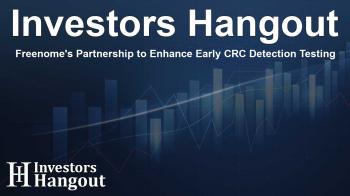Freenome's Partnership to Enhance Early CRC Detection Testing

Freenome Enters License Agreement with Exact Sciences
Freenome, an innovative biotechnology company dedicated to enhancing cancer detection, has officially announced a significant partnership with Exact Sciences. This exclusive license agreement focuses on commercializing Freenome's groundbreaking blood-based screening test for colorectal cancer, a crucial step forward for early detection of this prevalent disease.
Financial Details of the Agreement
The agreement is valued at up to $885 million, contingent upon the achievement of various regulatory milestones and screening guidelines. As part of this partnership, Freenome will benefit from an upfront payment of $75 million, along with potential milestone payments totaling $200 million linked to FDA approvals and future product iterations. Additionally, they stand to gain up to $500 million in royalties based on the test’s performance within preventive service guidelines.
Advancing Technology with Real-World Data
Freenome's test leverages the power of real-world patient data and multimodal molecular data to enhance its artificial intelligence and machine learning models. This data is instrumental in refining Freenome's platform to deliver more accurate results, significantly contributing to early detection efforts.
Commercialization and Market Access
The collaboration with Exact Sciences is set to accelerate the market introduction of the colorectal cancer blood test. With access to approximately 400 health systems and over 260,000 ordering physicians, Exact Sciences plans to streamline integration and increase accessibility for patients needing screening. This strategic move not only helps Freenome process tests and return results but also aids in identifying eligible patients for multiple tests.
CEO Perspectives on the Partnership
Aaron Elliott, Ph.D., CEO of Freenome, expressed excitement about the agreement, emphasizing its potential to bring their CRC blood test to patients faster, enhancing access to early cancer detection. Kevin Conroy, the CEO of Exact Sciences, echoed this sentiment, highlighting the agreement's role in expanding market options and improving outreach to unscreened populations.
The Impact of Early Detection
Colorectal cancer (CRC) remains the second deadliest cancer worldwide, claiming more than 50,000 lives annually in the U.S. alone. Early detection drastically improves survival rates, with over 90% for cases discovered at initial stages. However, despite the critical nature of timely screening, a significant portion of eligible adults is not current with screening guidelines. Freenome’s less invasive blood test offers a promising alternative to traditional screening methods.
Freenome’s Vision for Personalized Cancer Detection
Freenome is at the forefront of personalized early cancer detection. Their multiomics platform—an integration of genomic, epigenomic, and proteomic analyses—utilizes AI/ML models to identify cancer signals in the bloodstream, particularly through circulating tumor DNA (ctDNA). Their focus extends beyond CRC, with ambitions to advance personalized cancer detection capabilities across various types, including lung cancer.
Looking Ahead: Future Innovations
The comprehensive upgrade of Freenome's assay aims to produce a next-generation version of their CRC test. Preliminary studies have indicated enhanced performance in detecting CRC and advanced precancerous lesions. These developments are poised to be critical milestones as the company continues its discussions with the FDA regarding future approvals.
About Freenome
Headquartered in California, Freenome is breaking new ground in early cancer detection with its suite of blood tests designed to identify the subtlest cues of cancer. Their commitment to accessibility in cancer screening fuels their collaborations with healthcare organizations to integrate their innovative testing into standard healthcare practices.
Frequently Asked Questions
What is the primary goal of Freenome's partnership with Exact Sciences?
The partnership aims to commercialize Freenome's blood-based screening test for colorectal cancer, enhancing early detection capabilities.
What are the financial terms of the agreement?
The deal includes an upfront payment of $75 million, milestone payments of up to $200 million, and potential royalties based on test sales, totaling a possible $885 million.
How does Freenome's technology improve cancer detection?
Freenome utilizes real-world patient data and AI/ML models to refine its screening tests, allowing for greater accuracy in cancer signal detection.
Why is early detection of colorectal cancer important?
Early detection significantly improves survival rates; for CRC, the survival rate is above 90% when caught in the initial stages.
What future developments is Freenome pursuing?
Freenome aims to advance its personalized cancer detection platform and complete the next-generation version of its colorectal cancer test for FDA submission.
About The Author
Contact Caleb Price privately here. Or send an email with ATTN: Caleb Price as the subject to contact@investorshangout.com.
About Investors Hangout
Investors Hangout is a leading online stock forum for financial discussion and learning, offering a wide range of free tools and resources. It draws in traders of all levels, who exchange market knowledge, investigate trading tactics, and keep an eye on industry developments in real time. Featuring financial articles, stock message boards, quotes, charts, company profiles, and live news updates. Through cooperative learning and a wealth of informational resources, it helps users from novices creating their first portfolios to experts honing their techniques. Join Investors Hangout today: https://investorshangout.com/
The content of this article is based on factual, publicly available information and does not represent legal, financial, or investment advice. Investors Hangout does not offer financial advice, and the author is not a licensed financial advisor. Consult a qualified advisor before making any financial or investment decisions based on this article. This article should not be considered advice to purchase, sell, or hold any securities or other investments. If any of the material provided here is inaccurate, please contact us for corrections.

